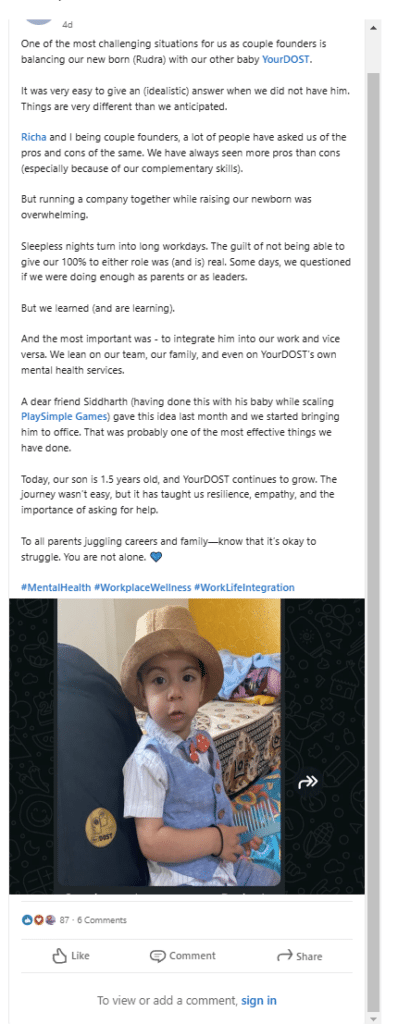Balancing parenthood and entrepreneurship is a complex journey, as highlighted by the co-founders of YourDOST, Puneet Manuja and Richa Singh, who share insights into managing work-life integration, mental health, and family-friendly workplace policies.
Table of Contents
How Your 3 Year Old Can Start A Startup
YourDOST mental health platform co-founders Puneet Manuja and Richa Singh recently discussed how to manage a startup and a newborn. Their story mirrors the struggle of the parent entrepreneur and shares some lessons on work-life integration, the startup ecosystem in India, and the kind of policies corporations may want to offer to support parents with young children.
Steering the equilibrium between parenthood and entrepreneurship is not an easy deal. Sleepless nights and bouts of guilt and self-doubt became a daily routine for Puneet and Richa… somehow balancing knowledge about parent education with their own parenting and running a growing business. Nevertheless, they succeeded in merging their personal and working lifetimes. Unable to find childcare for two weeks after his wife’s due date, they volunteered to bring their son. They leaned on their team and turned a situation that could have been an obstacle into an opportunity for teaching and resilience.

Starting a Business in India: Challenges and Realities
Starting a startup in India is a tough effort. Entrepreneurs face a labyrinth of regulations and compliance. Registering your business, taxes, and labour laws can also take a long time and are complex. Moreover, funding access is still a hurdle, with investors insisting on stringent due diligence and robust business plans.
India’s infrastructure and bureaucratic processes challenge entrepreneurs. Delays in acquiring licenses or setting up physical infrastructure are commonplace. This can deter new business owners and raise barriers to entry. Yet initiatives like Startup India are trying to simplify the processes, provide lending and mentorship support, and even offer tax exemptions.
Legal Framework and Startup Policies in India
The structure of a business within the law is of great significance. With several models at their disposal, entrepreneurs in India can choose Sole Proprietorship, Partnership, Limited Liability Partnership (LLP), or Private Limited Company. The growth in the varieties of business structures has each had its challenges and advantages when it comes to taxation, liability, and compliance.
In addition to the Startup India initiative, the Indian government has also introduced policies to encourage startups. This program provides tax holidays, subsidizes funding and simplifies compliance measures. Protection of intellectual property rights (IP rights) has also been emphasized to assure startups protection of their innovations through patents and trademarks. This is designed to be an ecosystem in which entrepreneurship can flourish.

Taxation for Startups: Navigating the System
The tax structure in India makes startups a complex issue. The corporate tax rates apply to private limited companies, whereas LLPs are taxed differently. The Minimum Alternate Tax (MAT) was introduced to force companies with large book profits to pay a minimum tax amount. Some tax exemptions, such as Section 80 IAC, allow startups to enjoy tax exemptions for a 100% deduction of profits for three years out of the first ten years of incorporation.
While both provisions strive to ease the tax burden on startups, it is important to understand the system and have an expert help plan it out. The entrepreneur is responsible for staying up to date on changing regulations to capitalize on available benefits and avoid penalties.
Mental Health in Entrepreneurship: Addressing Psychological Challenges
Being an entrepreneur is a mentally draining journey—it means long hours, big stakes, and lots of decisions. Puneet and Richa are entrepreneurs, and they, too, know about the challenges that entrepreneurs face—pressure to grow their businesses and responsibilities in their personal life. Often overlooked are feelings of self-doubt, anxiety, and burnout.
Entrepreneurs can benefit tremendously from investing in mental health support such as counselling services or wellness programs. Dismissing psychological challenges is not an option an organization like Puneet and Richa’s YourDOST takes seriously and rather stresses on handling it to build a sustainable and fulfilling entrepreneurial life.
The Right Age to Start a Business in India
It may not be determined by age, but by when you are ready. When young, it brings fresh ideas and a willingness to take risks, while old, still has industry experience and an established network. Timing has nothing to do with a number. In India, the startup ecosystem has been successful with founders of all ages, showing that if a founder’s personal circumstances are favorable, then it doesn’t matter if the founder is in your 20’s or 40’s.
Family-Friendly Workplace Policies: Supporting Employees with Families
Creating a healthy working environment crucially necessitates support for employees who are parents and, most particularly, the parents of newborn children. However, there are policies such as maternity leave, taken for granted under the Maternity Benefit Act, where eligible women get 26 weeks paid leave. It’s not a legal requirement for paternity leave, but more and more, progressive companies are making their way in offering it to fathers at the start of parenthood.
Parents can manage their dual work and family responsibilities through flexible work arrangements like teleworking and flexible work schedules. Companies with 50 or more workers must also have on-site childcare facilities, which affords working parents a break. While Puneet and Richa brought their son to the office by choice, a growing number of working parents are finding ways to unite elements of work and family life, and more systemic support is needed to enable that across industries.
Parental Support Systems: Community and Organizational Support
Parents who are juggling work and family life need strong support systems. This is fostered in organizations by creating peer support networks or offering resources like mental health services. In addition to workplace initiatives, community based initiatives such parent groups or local childcare programs can be a second layer of assistance.
For Puneet and Richa, the entrepreneurs, leaning on your team and external networks in times of life challenge proved to be a wise decision. In organizations, creating an open and collaborative culture empowers parents to find help when it is needed, reduce their stress, and improve their productivity.
Conclusion: Building a Supportive Ecosystem
Puneet and Richa’s story reflects the nuances of raising a family and running a business simultaneously and points to larger problems for Indian entrepreneurship at large. Government initiatives and corporate policies are welcome steps in solving the problems; however, more can be done to address the challenges at the systemic level.
Simplifying regulatory processes, charities offer robust support for working parents and improving infrastructure are essential to nurture an inclusive robust entrepreneurial ecosystem. For parents juggling careers and family, the message is clear: The struggle is real, but with strong resilience, support, and the right policies then success is possible.



